When Homer told the world olive oil was “liquid gold,” skincare was probably the last thing on his mind. But that doesn’t mean the poet’s words are any less true.
Olive oil is revered in the natural skincare world for its impressive power to nurture and nourish all skin types. When processed correctly, the benefits of olive oil are vast: unbelievable hydration, supple skin, and anti-aging effects are all within reach. But still, some are hesitant to put olive oil on their face.
Is It Safe To Put Olive Oil on Your Face?
Beauty products and brands will advertise soaps and lotions as oil-free, but is that a good thing? Your skin comes with natural oils, and while it’s true that excess oil can lead to breakouts, the solution to acne-prone skin isn’t cutting oil out of the equation. Your face needs oil.
Olive oil is safe to put on your skin. Like the natural oils already on your face, olive oil is non-toxic and entirely safe for all skin types. Think of it like a cousin to your natural sebum.
Can I Put Regular Olive Oil on My Face?
But that doesn't mean you should run to your local grocery store and purchase a commercial bottle of extra virgin olive oil. Though pouring cooking oil on your skin is not likely to cause any harm, you won’t see the skin benefits of olive oil as a food ingredient. To harness the power of olives, you need to use an olive oil specifically designed for your skin.
While all olive oil might look the same to the naked eye, they are very different under a microscope. Different oils have different molecular weights and sizes that react differently with your skin. Unrefined olive oils have the most molecular nutrients, so they have the most compatibility and bioavailability with the skin.
How Is Furtuna Skin’s Olive Oil Different?
Here at Furtuna Skin, we’re all about looking at olive oil at a molecular level. With nature as our muse, we’ve designed our olive oil to be scientifically better for your skin than other oils. With a rich supply of fatty acids vitamin E, vitamin A, oleic acid, and other nuggets of nature, our olive oil is formulated to meet your skin's specific needs. And, though we don’t recommend it, it probably tastes just as good.
What Are the Benefits of Olive Oil on the Face?
The many olive oil benefits go far beyond the kitchen. As a skincare ingredient, olive oil has many skin benefits that contribute to its support to your skin.
Supports Skin Health
Even small amounts of olive oil can have big benefits on the skin. Olive oil has soothing properties, meaning it often acts as a calming agent for the skin. Like how you use an ice pack to soothe a sore knee, you can use olive oil to soothe irritated skin.
These properties make olive oil a popular defense against certain skin conditions. Olive oil helps support the skin from within, targeting individual skin cells affected by ailments or impurities. With this kind of precision, olive oil works small to provide big benefits.
Maintains Skin Barrier
At Furtuna Skin, we look to the earth – not the lab – for inspiration. Our ingredients represent the best of nature and the best of skin health, and our olive oil is no different.
Unlike coconut oil, which is made of primarily saturated fats, olive oil has a plethora of healthy unsaturated fatty acids and antioxidant properties to thank for its skincare benefits. As a face oil, this ingredient is essential in strengthening the skin barrier, which can become dry and dull over time. Working in tandem with other hydrating skincare products, olive oil maintains your skin barrier so that it is ready for whatever life throws your way.
Improves Skin Appearance
Some people may be inclined to think that olive oil – or any face oil, for that matter – is only good for people with dry skin. It’s easy to assume that olive oil is a solution for dryness and that people with normal, combination, or even outright oily skin can’t benefit from the ingredient. But those people couldn’t be further from the truth.
Olive oil enhances your body’s natural microbiome, which has health benefits from head to toe. As your body’s largest organ, your skin receives a large portion of these benefits. Your skin depends on bacteria to absorb moisture and expel toxins, which keeps your skin clear of buildup and excess oils. Just as olive oil fuels your skin cells, it fuels the bacteria supporting them.
Is Olive Oil Hydrating?
As much as the natural skincare world praises olive oil for being nature’s moisturizer, the idea that oils are hydrating is a misconception.
Skin oils must be used with water to have a hydrating effect on the skin. Fatty acids like oleic acid and squalene enhance the skin’s natural barrier, which makes them great at locking moisture in. But these acids aren’t hydrating themselves. The benefit of olive oil on skin lies in its support of skin cells, not its ability to moisturize them.
That’s why Furtuna Skin incorporates water in all our oil-based products. Our Biphase Moisturizing Oil harnesses the full power of olives, using both olive oil and olive leaf water. Its ample supply of olive leaf water delivers an ocean full of hydration, and its protective olive oil keeps that moisture tight within the skin’s barrier. Alone, these olive derivatives would have a minimal effect on the skin, but when used together, these ingredients make for glowing skin.
How Should I Use Olive Oil on My Face?
The key to using olive oil on your face is finding products that understand the ingredient at a molecular level. Just throwing in a splash of this liquid gold isn’t enough to hydrate your skin. Your skincare products need to contain the right balance of oil, water, and other natural goodies to truly impact your skin.
Our Transformation Set uses olive oil in three ways to deliver natural nutrients to your skin.
- Prepare: First, prepare your skin with the Micellar Cleansing Essence. A cleanser, toner, and essence in one, this product sets the stage for your skincare by harnessing the power of olive leaf water and our Splendore Anchusa® Complex, which is clinically proven to block free radical damage by 100%.
- Treat: Next, treat your skin with our Face and Eye Serum. Made with organic olives, azurea blooms, and 10 wild-foraged plants, this hyper-potent product is designed to illuminate skin in one simple step.
- Hydrate: Lastly, hydrate your skin with Furtuna Skin’s Biphase Moisturizing Oil. Winner of the Cosmopolitan Holy Grail Beauty Product Award, this high-quality face oil considers hydration at a molecular level, combining the strengths of olive oil and olive leaf water into one Skinimalism product designed to replenish your skin’s natural moisture the right way.
The Bottom Line
So, can you put olive oil on your face? Absolutely!
Olive oil isn’t called liquid gold just for its color. Like the fruit it comes from, olive oil is a great source of natural acids and antioxidants that carry all kinds of skin benefits — whether you have sensitive skin or are breakout-prone. More than just improving the look and feel of your skin, olive oil supports skin health by protecting your skin’s natural oils and strengthening the skin barrier. With that kind of power, there isn’t much this luxury skincare ingredient can’t do.
Sources:
Anti-Inflammatory and Restorative Effects of Olives in Topical Application | PMC
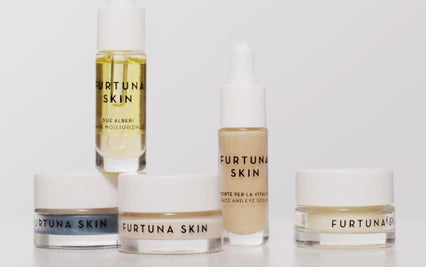
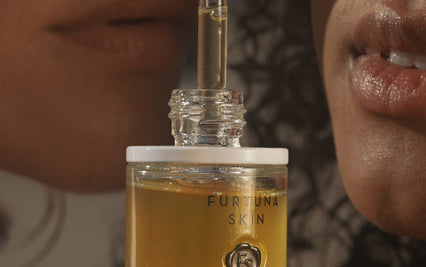
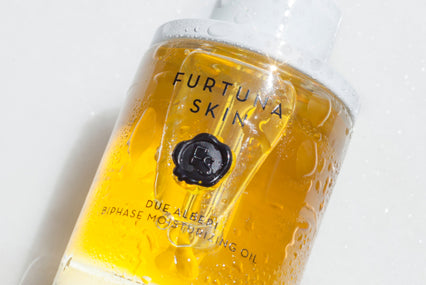
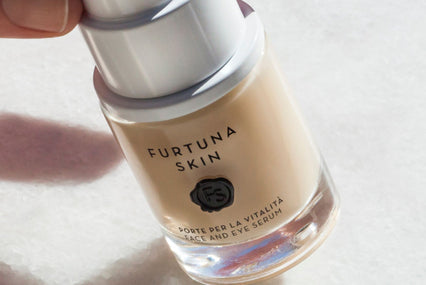
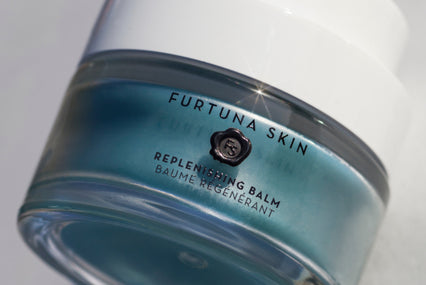
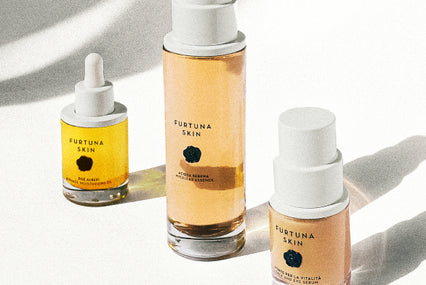
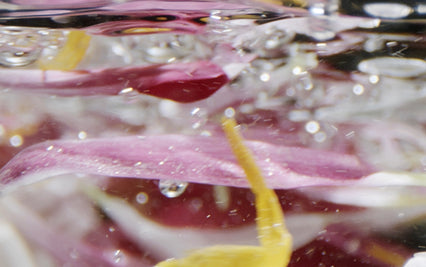





Comment